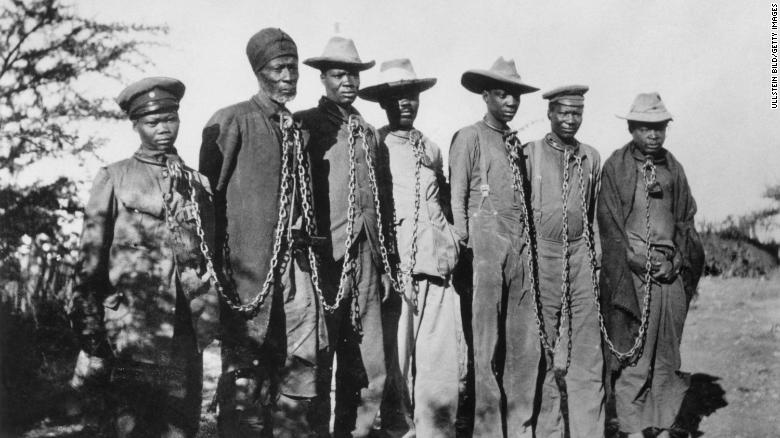Europe is turning on itself on its colonial baggage by paying for colonial crimes. Although this wave is beginning with Germany recognising and paying for genocidal annihilation of the Herero and Nama indigenous people in today’s Namibia some one century ago, keen sighted observers believe it is the beginning of reparations at last. Not with French president, Emmanuel Macron also ‘apologising’ for its own baggage in the more recent genocide in Rwanda.
There is no guarantee that what an African political economist calls “the bigger culprits — Britain, France and Portugal – would pay but there is also no guarantee that a global justice coalition will not rise tomorrow in defence of that line of action. But he told Intervention that “the issue should always be front and centre in development discourse; and that those convinced about it need to get their act together.
The CNN news item says Germany would support Namibia and the descendants of the victims with €1.1 billion ($1.3 billion). The sum is to be used for reconstruction and development. But beyond the material dimension is Germany asking for forgiveness for the “crimes of German colonial rule”. That is what the CNN quotes Heiko Maas, the German Foreign Minister as saying in a statement on the position.
“Our goal was and is to find a common path to genuine reconciliation in memory of the victims. This includes naming the events of the German colonial period in what is now Namibia, and in particular the atrocities in the period from 1904 to 1908, without sparing or glossing over them. We will now also officially call these events what they were from today’s perspective: a genocide,” CNN quotes Maas as saying.
Although the victims groups have reportedly rejected the deal, with their leader, Vekuii Rukoro, the Paramount Chief of Herero people, former attorney general and member of parliament telling CNN that they were not part of the discussion with the German government, it is a trend which that standpoint might not shape fundamentally since colonialism is a unique, Africa wide experience.
Moreover, it seems the grouse of the leader of the victim groups is not that reparations is not acceptable but that reparations should have been in the form of a collective payment to the descendants of those killed and pushed off their land during the genocide rather than payment to individual people.
CNN credits Vekuii Rukoro with asking: “Is this the kind of reparation that we are supposed to be excited about? This is just a public relations. This is a sellout job by the Namibian government. The government has betrayed the cause of my people”.
While the Namibian government sorts that procedural matter with the indigenous people concerned, the larger picture of reparations is likely to excite Africa, more for the symbolic reason that there exists no justification for colonialism. The way the Namibian government is quoted as seeing the formal acceptance of the atrocities as genocide as a key step in the process of reconciliation and reparation is most likely to be how much of the rest of the world world would see it.
According to the Namibian presidential press secretary, Alfredo Hengari in a CNN interview, “These are very positive developments in light of a very long process that has been accelerated over the past five years. People will never forget this genocide; they live with it. And this is an important process in terms of healing those wounds”.
CNN’s recollection is that German troops killed up to 80,000 of Herero and Nama people in the southern African country between 1904 and 1908 in response to an anti-colonial uprising, according to the United States Holocaust Memorial Museum. CNN also credits historians with saying the bloody conflict happened when the Herero indigenous people revolted against colonial troops over land seizures. Germany, which today gives development aid to Namibia, offered its first formal apology for the conflict in 2004.
Backgrounding the story, CNN says both Germany and Namibia had been in talks since 2015 to negotiate compensation for the massacre by German colonial forces. And Maas said in his statement that representatives of the Herero and Nama communities were “closely involved” in the negotiations on the Namibian side.
“The crimes of German colonial rule have long burdened relations with Namibia. There can be no closing of the book on the past. However, the recognition of guilt and our request for apology is an important step towards coming to terms with the crimes and shaping the future together”, it further quotes Maas, adding how German media is reporting that an official request for forgiveness will be made by German President Frank-Walter Steinmeier at a ceremony in the Namibian parliament.
“A decision on a possible trip by the Federal President will be made after the governments have reached a formal agreement and in close consultation with the Namibian side,” a spokesperson at the office of the Federal President also told CNN.
In the case of France, the hesitant apology is over accusations against France for failing to prevent the genocide in which Hutu militia killed nearly a million ethnic Tutsi in the April – June 1994 genocide in the country. France is also believed to have remained in support of the the Hutu regime well after the start of the genocide.




























